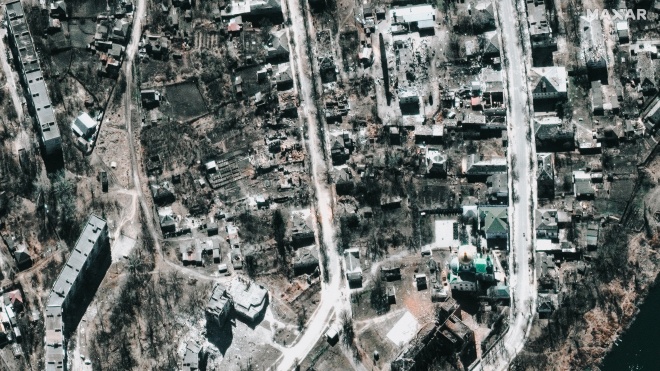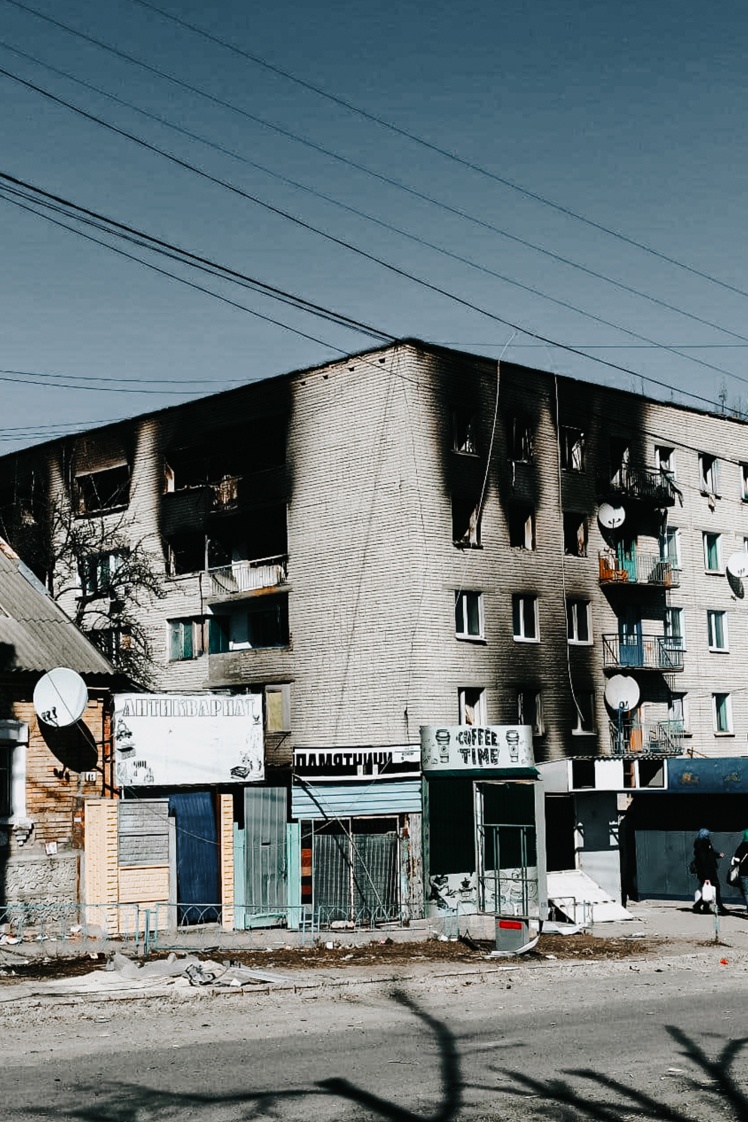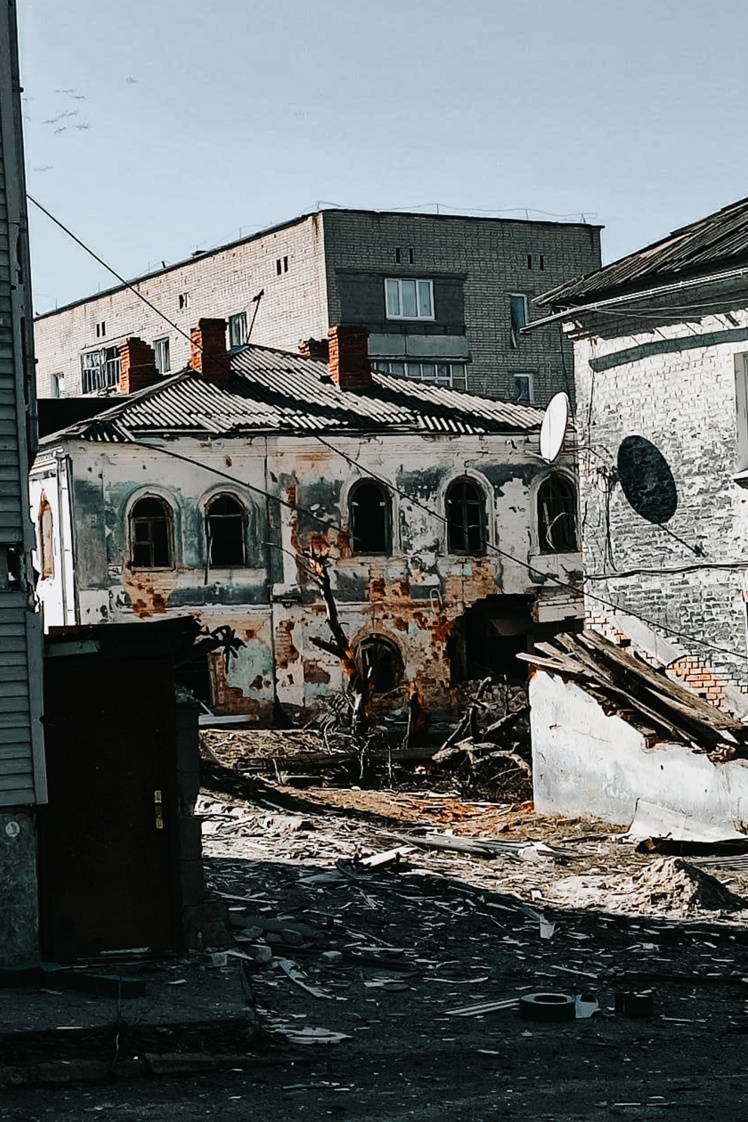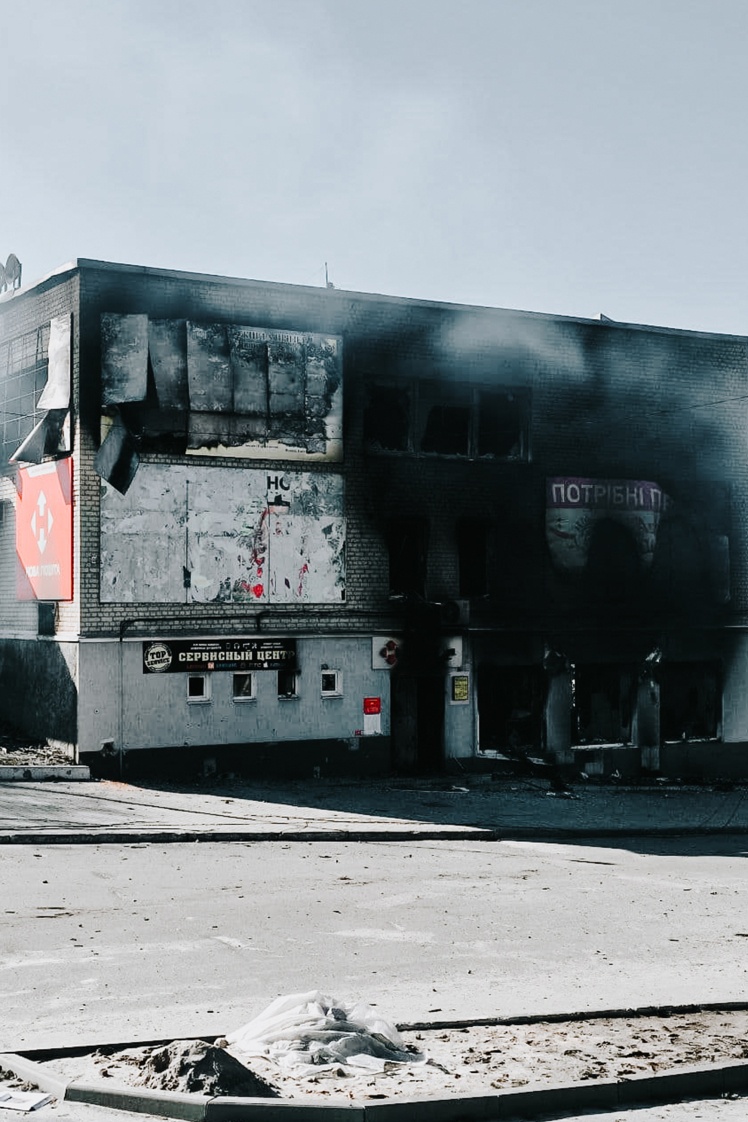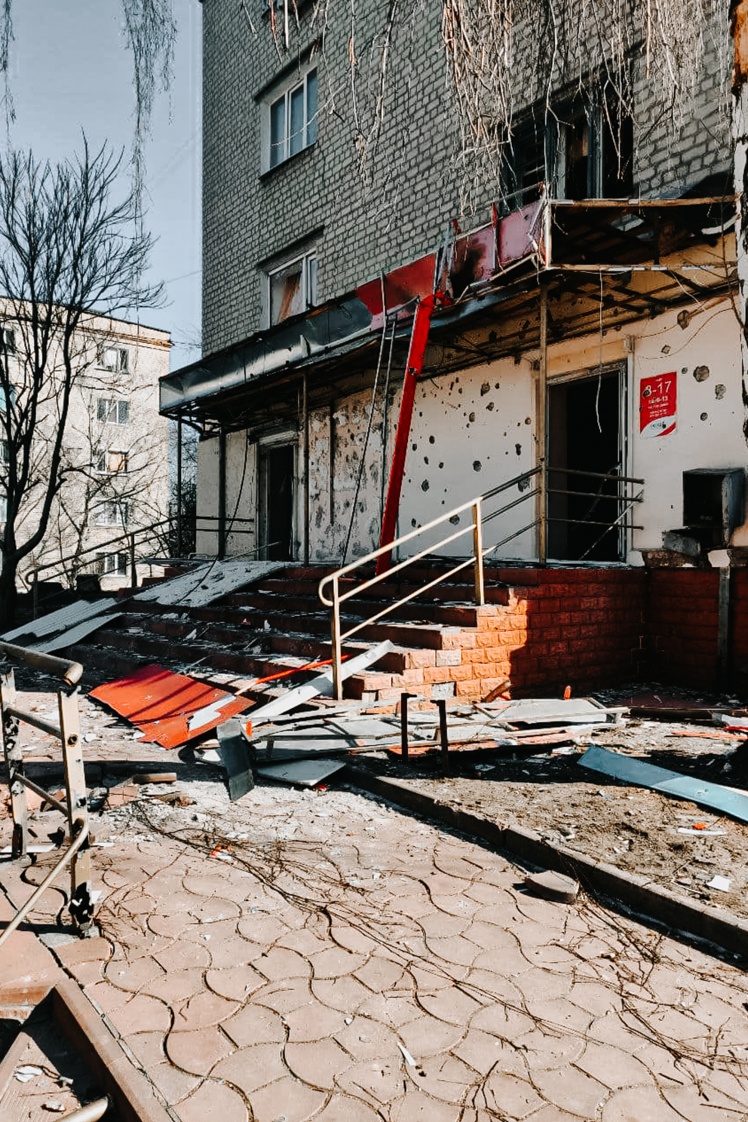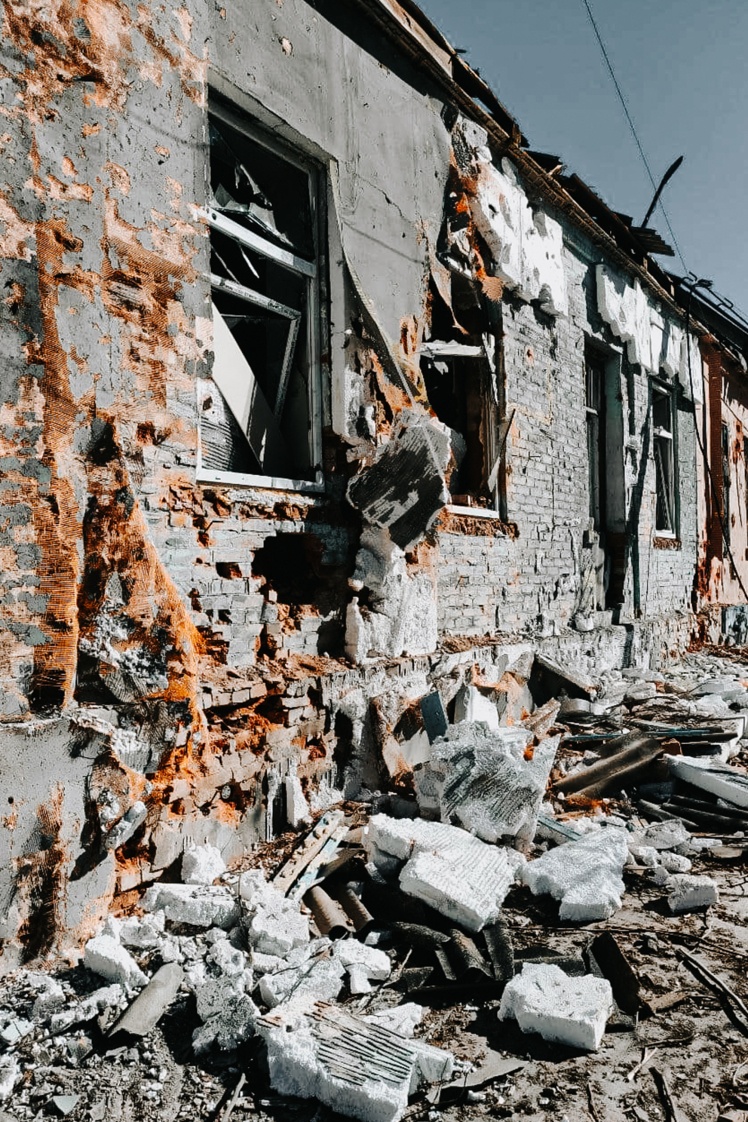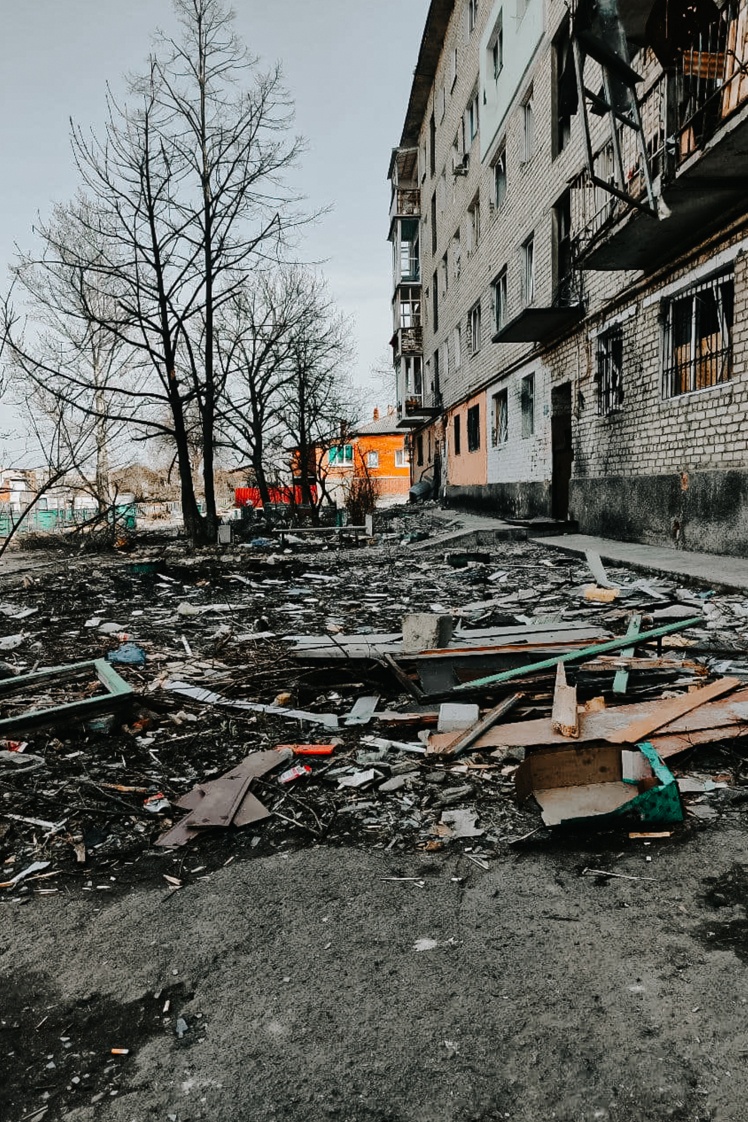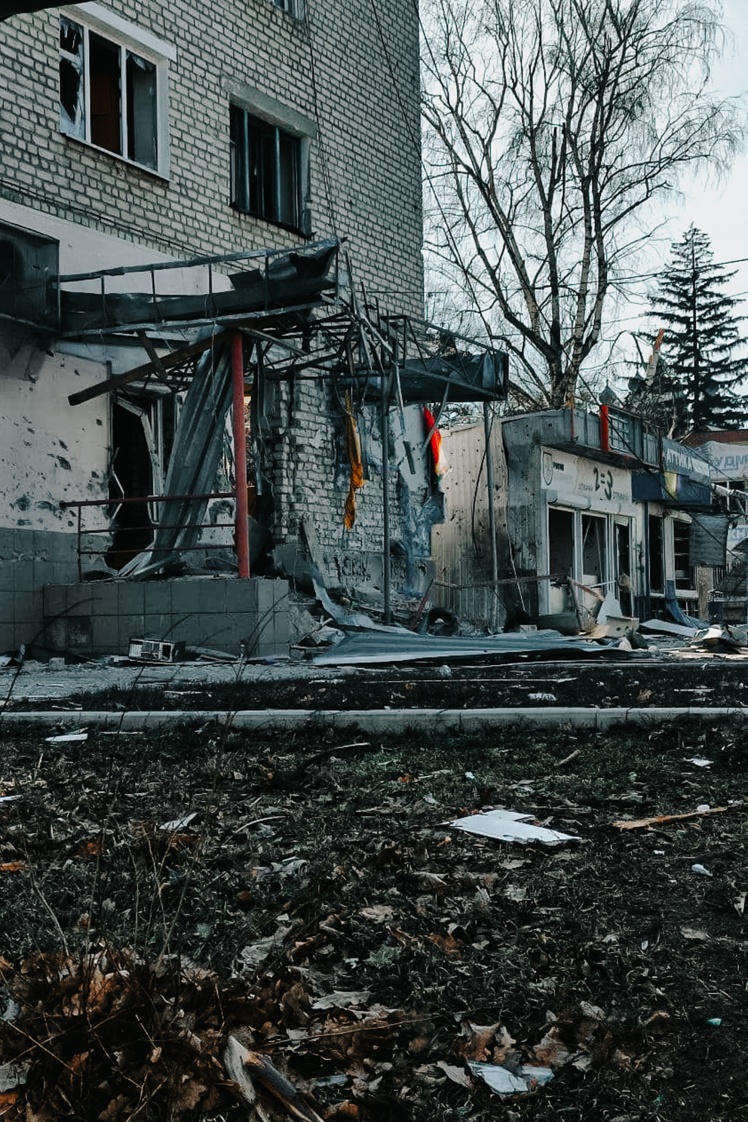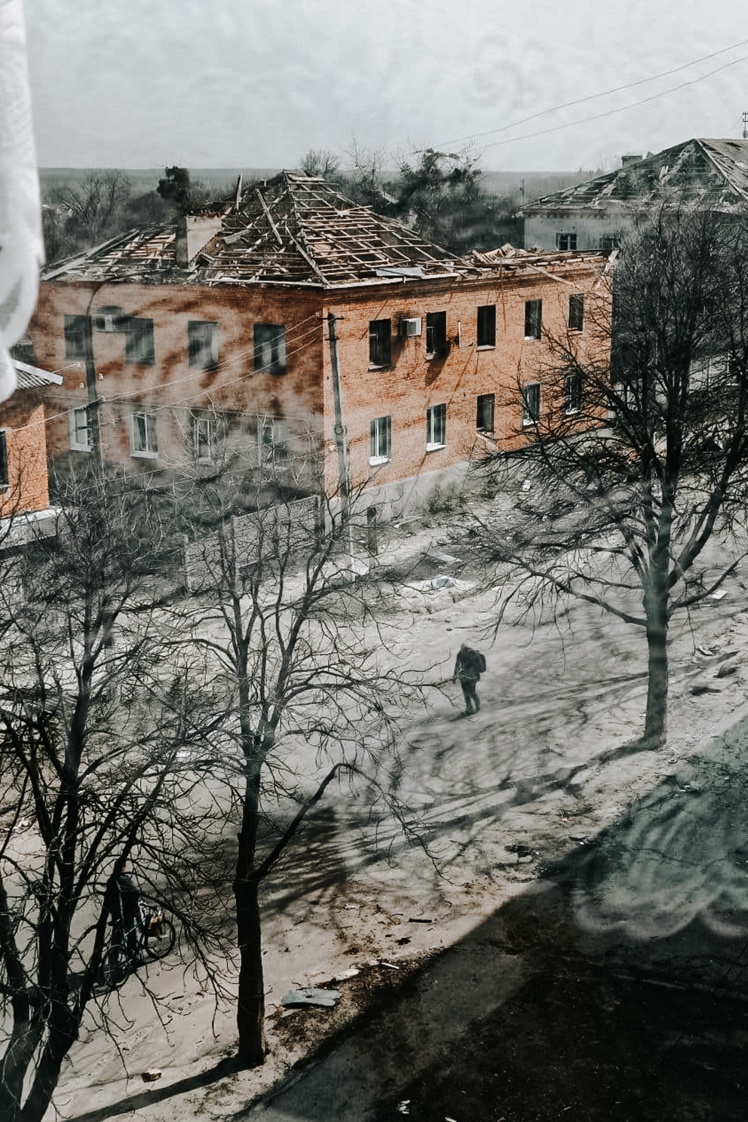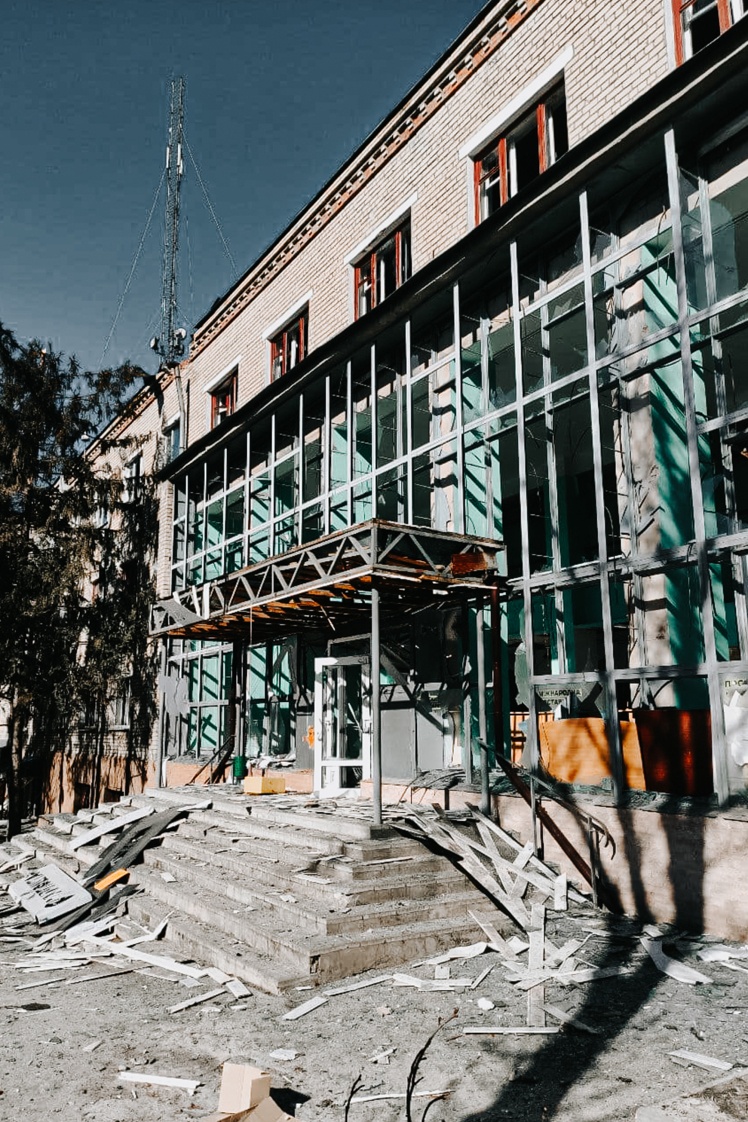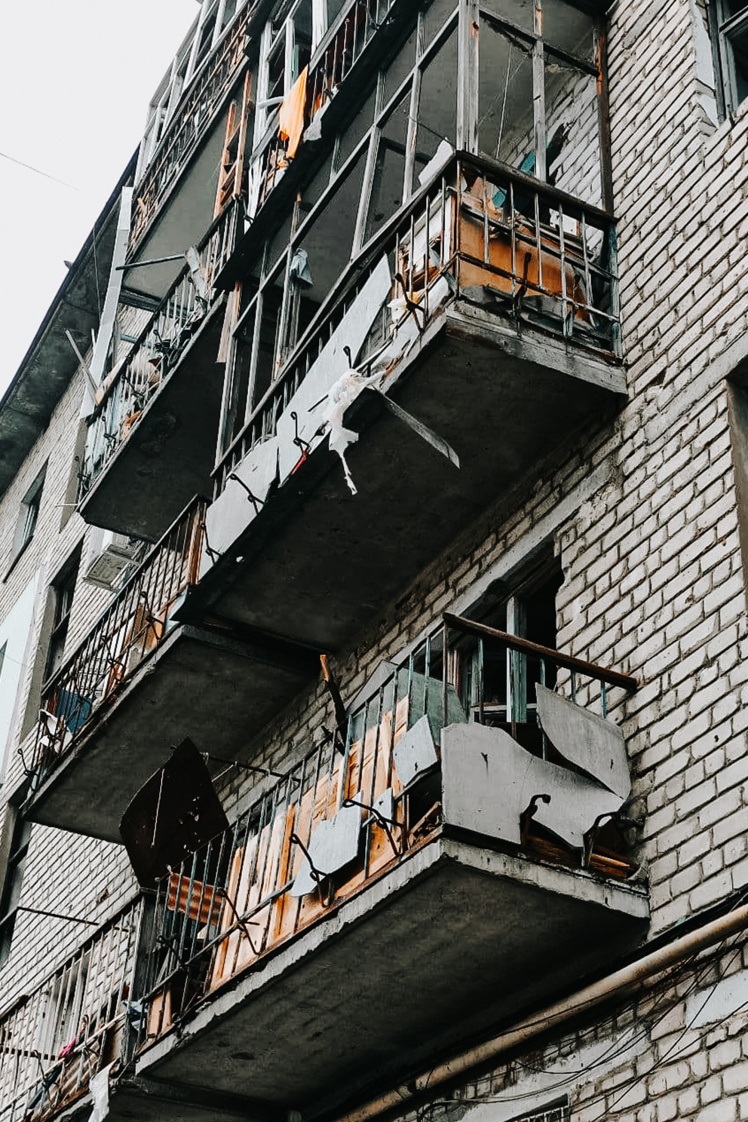The beginning. Together
Remember February 23, the last day before the war. What were you doing? Did you expect the war to start at night?
Ilya: On February 23, we met and discussed the level of danger, thinking about how to treat it. But nobody wanted to assume that such events can become real in the 21st century. There was a lot of anxiety, but no one thought it was possible.
Victoria: We thought that Russia was just trying to scare us. And we met in the center of the city, near the 4th Izium Lyceum. Itʼs a historical lyceum, where Zhukov studied. Currently, the building is no more.
How was the night of February 24?
Ilya: Nothing happened then. They started bombing us on March 2. Before that we heard explosions somewhere far away, but that day an air bomb had fallen.
Victoria: At five in the morning, a friend from Kyiv called me and said that they were being bombed. I didnʼt believe it, I thought it was a provocation. And two hours later I watched the news and realized that this is the war. Panic among the locals began somewhere on February 28, when the shops closed, people started to buy everything en masse, forming queues of 200-300 meters. It was no longer possible to withdraw money at ATMs.
Ilya: At first, the most difficult thing was that shops, gas stations and pharmacies stopped accepting non-cash payments. You need cash, but you donʼt have it.
Didnʼt people leave the city en masse then?
Victoria: No. locals didnʼt believe they may get help in other Ukrainian cities. Many people thought that if you went somewhere, you would be homeless and no one would give you a piece of bread.
Didnʼt you think to leave in the first days?
Victoria: There were thoughts about that, but my family didnʼt want to leave, and I decided not to part with them.
Ilya: It was possible in the first days to go to Kramatorsk by car. There was one place [in the car], I offered it to Victoria, but she refused. And then my parents changed their minds, because of our dog. He is quite large, it was unclear how to take him by train from Kramatorsk. There was an acquaintance who could take us out with a dog and cats, he planned to leave, but not right then. So we stayed in the city, actually, because of the dog.
Victoria: In the first days of the war, Ilya and I were at his house together. On the third day I decided to go to my mother: she lives by the river. And while I was there, a day or two later, ours [the Ukrainian Army] blew up bridges to prevent the Russians from passing. We were cut off from each other. Ilya was in the occupation, and I was in the center of the city, where our defense was located.
Ilyaʼs story
Ilya: The first two bombs were dropped either on my district or on the one where Victoria was. It happened on March 2. “Our” bomb didnʼt explode, and the one that fell in the center did. The center of Izium is on a mountain, itʼs one of the highest points in eastern Ukraine. At the bottom of it is the river Siversky Donets. After the air bombs, the Russians came to our area as if at home, brought equipment, artillery, and stood along the river. And they started shelling the city center, where there are multi-storey residential buildings. I have already read that 70-75% of these buildings are already destroyed.
Nearly to mid-March, my parents and I were sitting at home all the time. Then I saw the Russians taking out a column of their destroyed vehicles. And I decided that itʼs possible to go out, gather information, see what was happening in the city.
Photos and videos were taken by Ilya and Victoria
«Babel'»
Was it our Territorial Defense that destroyed their vehicles?
Ilya: Itʼs hard to say for sure. But as far as I know, the Territorial Defense, which was behind the river in the center, had only mortars and small arms. And from these mortars they managed to beat quite heavy equipment. The defense was all locals, they were outnumbered by the Russians, but they held the city center for three weeks. I think itʼs just fantastic. Despite the fact that the Russians were trying to surround the city, somewhere in the south the Territorial Defense had the corridor for supplies, in the direction of Slovyansk.
So when the constant shootings across the river subsided, I decided to walk to it, itʼs about 3 kilometers from me. I saw that part of the city was destroyed. Met locals who said that it was dangerous to get close to the river, because the Russians shot several civilian cars there and the bodies still werenʼt removed. I also saw looting among the locals: they began to take everything out of the shops, even household appliances.
Victoria: There even were organized gangs of looters. I know of cases when people have been killed trying to protect their property. These were not Russians yet (they started looting later), but locals. Everyone took something from the shops, but sometimes it was necessary — food, hygiene, batteries. I donʼt consider this to be looting, it is survival. But robbing and taking out washing machines is another thing.
Ilya: Sometime in the second half of March, the Russians took out their broken vehicles and went in again, more thoroughly. First came their advanced parts, I think the "DPR" units, in bad gear, old boots and work gloves. Interestingly, for several days they tried to stop looting in my area, but then started to join it themselves. Shops that could not be broken due to the bars or thick doors, they just burned.
Photos and videos were taken by Ilya and Victoria
«Babel'»
What they were generally doing?
Ilya: First they occupied schools, kindergartens and churches. They settled there. There was one warehouse, they distributed all the food that was there to the townspeople free of charge. And then the occupiers went inside and drove heavy equipment there. Checkpoints were set up all over the city, which were very different, this is a separate topic. They set their mayor. This is a former employee of the Izium prosecutorʼs office Vladyslav Sokolov.
And what did the current local government do?
Ilya: Mayor Valery Marchenko left the city somewhere in early March. He didnʼt organize any evacuation. It was difficult to follow this, because on March 6 all [mobile and internet] connection in Izium disappeared. At the same time, electricity disappeared, and with it the water. The gas was gone even earlier. And by March 10, there was definitely no authority in the city. We started turning the radio on somewhere after March 20, because before that we didnʼt understand what date it was, what day of the week, there was no place to charge the phones. It was later when I decided to charge the phone from the car battery, but it gave just a couple of percent [of the charge] a day.
By the way, how was life organized during the occupation? In your part of the city, across the river.
Ilya: In my case, it was easier because I have a private house. It was possible to heat the house with firewood, there was a fireplace, there was a bath. We collected about 400 liters of water in advance, and in my area there is a water source on the territory of the monastery. There was a lot of food in the freezer. It didnʼt work, but we made ice on the street, so even the meat lasted like that for 40 days. Me and my parents had enough to eat until the beginning of April.
Did neighbors help each other?
Ilya: Sometimes, but extremely ineffective. For example, our neighbors refused even to sell us potatoes, let alone giving it for free. They were afraid that they themselves would not have enough.
Photos and videos were taken by Ilya and Victoria
«Babel'»
How did the Russians interact with the locals in your part of the city?
Ilya: The most unpleasant thing we had was that they went into houses, pressed the local population, beat someone, took something away, intimidated, but without such atrocities as it was near Kyiv. “DPR” soldiers entered the house of my acquaintance, started to tell that they will kill the whole family, threw a grenade in his yard. He went to their command and complained about it. After that they came and apologized.
Interestingly, in the second half of March, the Russians brought their radio to Izium. A communication center was set up at the school, and various propaganda fables in the style of "Ukrainians, surrender" began to be aired. They even put their DJ in, he tried to tell the weather forecast. But for some reason the radio only worked for a few days. Also they scattered leaflets which looked like they were designed by some schoolboy.
Could it be connected with a certain loyalty of the local population to the Russians?
Ilya: Itʼs hard for me to say what percentage of the Izium population is loyal to the Russians. First, it is often a population of 40+ years, and young people are patriotic. Secondly, most of these people donʼt expect, for example, to join Russia or something like that. They are just loyal to Russia and ready to forgive it a lot. Apparently, the Russians also took this into account.
Victoria: We have a lot of people who went to work in Russia. There have always been Izium-Moscow minibuses. Many have family members in Russia. That is why there are so many citizens loyal to Russia. But it is interesting that in recent years many people started going to work not there, but in Poland, for example. They saw how people live there, and gradually began to change their minds to pro-Ukrainian. But itʼs a long process. After the shelling, though, it intensified.
Was there any humanitarian aid from the Russians?
Ilya: At the beginning of April, the products started to run out. And they started handing out humanitarian aid. I donʼt remember the date, but the first time when they distributed it was somewhere from the 5th to the 10th of April. It was done for propaganda purpose. Their reporters arrived and started filming how the food is distributed. Every person was given several cans of canned fish, a couple of cans of stew, several packets of cereals. And also some bread.
But it was огіе once. The next time there were no cameras or reporters, and the "aid" was way more modest — one can of stew, one packet of cereal, plus some pate. At the same time, their military began to change into civilian clothes, walk around the city, communicate with the population to "understand the mood". And not only that, they entered the cityʼs barter system. Went to the markets, took moonshine from the locals.
How was April in the occupation?
Ilya: In the first decade of April, our troops began to attack the Russiansʼ positions. With missiles, quite selectively. We have a large parking lot in the area. The occupiers put their equipment there. And at the beginning of April ours [Ukrainian side] fired rockets at this parking lot, burning out everything there. A week later, the rockets landed in a wasteland on the site of a former DOSAAF building. The Russians began to put equipment there, and ours destroyed it with missiles again. Of course, something flew into someoneʼs yard, but it was clear that ours tried to hit the point. And then the school, where the Russians settled, also was blown up. This was in the second half of April.
I heard a Russian telling the locals on the street that 800 their people [Russian soldiers] had left for Slovyansk city, but only 170 had returned. "Just donʼt tell anyone!", he added.
A soldier just simply stood on the street?
Ilya: He was young, 20 or so years old. He was standing in line for braga with the locals. Even moonshine has already run out in the city, but braga was sold for 40 hryvnias per half a liter.
So, the shelling increased throughout April. It was ours who destroyed their positions. Some 15 km from us they [Ukrainian military] shelled their [Russian] artillery, it was audible and even visible. Then I read that Russian general was burned down there, Simonov, it seems. Then Russian missile system was destroyed, just next to us. Accuracy shows that I believe that there is a [pro-Ukrainian] guerrilla movement in Izium. And the shootings lasted in the city for two months, as far as I understand. Some part of the population actively opposes Russians.
Did the priests of the Moscow Patriarchate cooperate with the occupiers?
Ilya: I saw Russians approaching those churches, being baptized, taking off their hats, kissing icons. The only Ukrainian church in the city was in the center, where Victoria lives, it was damaged by Russian missile. And in my part of the city there are only Moscow Patriarchate churches.
In Izium there is the Holy Ascension Cathedral and the monastery, they are of the Moscow Patriarchate. Even before the war in January, I met its monk accidentally. I took photos there, he approached me, we talked for three hours about life and all that. Already in the occupation, I went to them for water to the source and met him again. He was surprised, knowing my views, and said, "Wow, youʼre alive. Come on, letʼs talk. " And I came to him on Palm Sunday and asked how he felt about these events, about the invasion. He thought for a while and said, "I donʼt know." And then he said, "Well, these [Russians] are our gyus." We talked to him, and Russian soldiers were standing around us. I asked him to help me find dog food, he then handed me a package, and there were cans of pate from Russian soldiersʼ ration. Finally, he told me the following phrase: "I talked to the colonel today, you wonʼt go to Kyiv soon.”
«Babel'»
Were there checkpoints in the city?
Ilya: I had to walk through checkpoints. And for some reason I did not think to erase data on my phone. I saw people being interrogated, undressed, their phones were looked at. I have a tattoo. They [Russians] also asked about them, asked to explain their meaning. When they saw that I had a Kyiv registration, they began to question me meticulously, I said that I was just a student. Then they took the phone. I thought: well, now Iʼl get at least to the basement [for interrogation], and maybe they will shoot me right here. But for some reason they only looked at text messages and Viber, where I have nothing. They didnʼt even go to Telegram messenger. After that I immediately erased everything suspicious from my phone. Because you can get lucky like that only once.
Victoriaʼs story
Victoria: When on the third day of the war I went to my mother in the center of Izium, the bridges were blown up, I was cut off from Ilyaʼs house. My mother and I were able to buy something in the store on March 1. We took food enough to survive for 10 days or so.
On March 2, at 11:55 p.m., I heard a plane flying over us. My mother and I ran into the corridor, sat on the floor, covered ourselves with a blanket. We started to cite "Our Lord" prayer. The worst thing is the sound of a bomb falling, itʼs such a shrill whistle. It felt like it lasted for eternity, though everything happened in just three minutes. The bomb fell 300 meters from my house. Then the next one. This is the city center, central park, next to the city hall. Russians bombed for about 20 minutes. We didnʼt run to the basement, because we did not have time, we were afraid.
Was there a basement in your house?
Victoria: Yes, we went to the basement the next morning. Began to settle there. The basement is a normal, dry one. But we didnʼt think that it would become our home for 60 days. We took to the basement our grandmother and my aunt from another district. We have a five-storey house, the basement is divided into several rooms. Sometimes other residents came down to us. In the first three days we heard explosions, but we sat quite calmly. There still was electricity, you could return to the apartment, prepare food, put a kettle on the stove. Then we managed to have the electricity in the basement.
On the evening of March 6, there was a massive shelling. Something landed in our basement, apparently a mine. We were very lucky that it flew through the window into the room, and there was no one in that room. I even saw a person who showed [the Russians to aim at] our house. For two days, the man with a push-button phone recorded something and circled around the house. Now there are five shell craters near it.
Behind the wall of the basement room, where the mine exploded, there was a family with five children. The blast knocked everyone in the basement to the ground, although the walls withstood. We began to suffocate, because everything was dusty, nothing could be seen. Luckily, we brought water sprays to the basement in advance to settle the dust. So after we recovered, we started spraying water to have something to breathe.
Photos and videos were taken by Ilya and Victoria
«Babel'»
And what did you do next?
Victoria: I had to spend the night in the same basement. And where else to go? The apartments were gone. The windows all broke, and itʼs early March, itʼs cold. The very building itself cracked. The next morning I went out and recorded the consequences of the blast in our basement on video. And 40 minutes later another mine fell — right where I was standing. Fortunately, I had already went down to the basement at that moment.
We could not stay in our basement because there were some debris, there was dust everywhere, no fresh air. We couldnʼt go outside because of the shelling. I had to knock the wall to the basement of the next entrance with pipes.
How did you eat in the basement?
Victoria: It was canned food. Cucumbers, tomatoes. We took something from the undamaged apartments of our house. There were about 15 people in the basement where we settled. And further in the basements these also were people, with children, many old ones. They all had a bucket for a toilet. But in this circumstances we even managed to make coffee, to grind coffee beans. Someone brought a battery, hung an LED strip on the ceiling. The light was lit in the entrance, the boys walked between the first and second floors and fried food there. The meat was salted, butter was poured with salt water so that it would not spoil. We ate food with expired consumption date — it was like that.
Was there no evacuation at all?
Victoria: There was some. On March 9, I ran to another apartment where my grandmother lived. There was a cat I had to take care of, also needed to take some things. Itʼs about 10 minutes walk from our house. On the way back I saw buses. The Ukrainian military approached me and said that there was an evacuation, in the direction of Barvinkove and Lozova towns. I ran to the basement and informed everyone, but no one left. My mother also said she wasnʼt ready to go. It was difficult for her to leave the city where she had lived all her life. I also stayed, as I coundnʼt go without my mother, aunt and grandmother. So the buses went almost empty. And the next day there were no more evacuations.
Ilya said that people in Izium didnʼt believe that they would get help anywhere else.
Victoria: Yes. Although everyone will still have to leave Izium. Even if we fight the city back or there will be a “green corridor”, itʼs still impossible to live there. We talked to communal workers in Izium, who went to check the electricity and gas. They told us that it would take at least a year to repair all the communications. Therefore, volunteers and the military in some cities need to really persuade people to leave them. Explain that everything will be fine, that they will be settled and so on. If we say "evacuation is for those who want it", then almost no one will go. Especially old people. They donʼt believe that there are volunteers who will help them for nothing.
And the next day after this evacuation, the shelling became even more terrible. The boys from the basement went down the street and said that there was nothing there at all, only the ruins after the air bomb. There used to be a school, a church. Not amynore.
Was there any connection with the part of the city where Ilya was?
Victoria: No. Well, there was a pedestrian bridge, you could cross the river on itʼs railing. But there was nuance. My father, who was on the same bank of the river as Ilya, tried to get to us. And the Russians told him it was a one-way bridge. That is, they will let him go to the center, but wonʼt let him back. So he could not pass it.
Ilya: And I finally crossed this pedestrian bridge.
Photos and videos were taken by Ilya and Victoria
«Babel'»
When was that?
Ilya: Sometime in late March. It was scary to go towards the city center and see more and more destruction.
Victoria: Yes, the houses around us were destroyed. I know a house where at least 50 people were sitting in the basement, I saw the news that 44 bodies had already been found there. The Russians completely captured the city on March 27. The Territorial Defense, which remained in the center, retreated to the nearby villages, which are still held by the Ukrainian army. The locals began to dismantle the blockages little by little. After April 10 it became very hot, the weather changed. Corpses began to stink. Then it rained, and the smell intensified.
We had to bury our neighbor in a bomb funnel near the house. An elderly sick woman came out of the basement to breathe fresh air and lost her consciousness. She broke her bones. We tried to resuscitate her, give fresh water from a syringe, we even found paramedics. But there was no hospital, no doctors. She died in two hours. If there was an ambulance service, she would be alive. But in the desert there is nothing to help with. There were already many graves in the city. Graves in every yard.
What changed after the Russians took the city center?
Victoria: The first thing I remember was March 28-29, when this collaborator [deputy of the Izium City Council from OPZH pro-Russian party Anatoliy] Fomichevsky stated that they would hand out humanitarian aid. I persuaded everyone in the basement not to go there, because this was definitely a provocation. But, of course, some of the townspeople still went there. Fomichevsky had a speech there. And then the shelling started nearby. And Fomichevsky immediately started jumping and saying: look, Ukrainians are firing at you. That is, people were gathered specifically for this demonstration.
They [the Russians] burned a lot. Already after our [Ukrainian] troops left the city. That is, some buildings werenʼt hit by missiles, they were just set on fire. Because the Russians donʼt need Izium. They donʼt care if there will be Izium or not.
Was it possible to buy products after the occupation?
Victoria: Markets have reappeared in the city in the second half of April. There one could buy meat, even vegetables. But most people still didnʼt have cash. That is, these markets were focused on Russian soldiers.
And where do the Russians get their hryvnias from? Or Russian rubles are already in use there?
Ilya: There is a specific economic system. The Russians are selling fuel, some of the tools they have looted — and receiving hryvnias. For hryvnias they buy something in the markets, most often itʼs alcohol. A liter of fuel can be bought from the Russians for 30 UAH. We left the city on such gasoline.
Victoria: Maybe some of the locals are already accepting rubles. We havenʼt seen this. Although in the second half of April we walked across that pedestrian bridge a lot. Saw many corpses, destruction, burned cars. I went to my father, they have a bath there, I was able to wash for the first time in a month. It was the first time in a month I spent the night not in the basement. And I went to Ilya as well. I tried to go to Ilya more often than he did to me, because itʼs easier for women at checkpoints. And Ilya has tattoos, It was better if he wouldnʼt be too visible.
Photos and videos were taken by Ilya and Victoria
«Babel'»
Evacuation
How did you decide to leave the city?
Victoria: I was looking for a way out of it. I negotiated with people, but our evacuation was constantly disrupted. There were no organized evacuations or safe corridors.
Ilya: My father has a car. But there was a problem. Most of the townspeople went to Russia. With their own cars or in Russian buses. We knew these routes, but we didnʼt need them. And people rarely went to the unoccupied territory, there were no organized convoys to it. We did not which way would be the best to do it.
At some point we learned that there is a route for departure. I will not say in detail which one, because is may still be used. By this route certain products were transported from [the free part of] Ukraine, and vice versa. We did not know what to expect from it, but still decided to go. And on the morning of May 3 we left.
And what was your general direction?
Ilya: Towards Kharkiv. Behind Balaklia town, the gray zone begins, and then the Ukrainian positions appear. The problem was that the Russians did not allow to get into Balaklia those who are not registered there.
How did the Russians behave at the checkpoints?
Ilya: In different ways. If the checkpoint is on the way out of the city and there are just Russians, they donʼt care about you. There were also Caucasians who did not want to let us through. And we had a legend that Victoria was six months pregnant and needed to go to the hospital in Balaklia.
Victoria: I got out of the car, pulled out my stomach, started telling them that I needed to go to the hospital immediately. They changed the tone, helped me to get back in the car.
Ilya: But in Balaklia there were makeshift checkpoints— with “DPR” soldiers with old rifles. They are rude, behave disgustingly, talk about "8 years of bombing Donbas". They almost busted our legend. We had to invent new stories, but eventually managed to leave Balaklia.
Victoria: They were so disgusting. They said, “Why are you leaving? Go back to your Izium and die there!” They said we were "running away from the war".
And then you went to Kharkiv?
Ilya: No, then we went in Poltava direction, to Pervomaysle town. Volunteers have already met and fed us there.
Victoria: They gave us orange juice. I forgot that it exists. And at the first Ukrainian checkpoint I was given four candies and told that everything will be fine. And when we arrived and I finally went online, I realized that almost nothing is known about Izium in the rest of Ukraine.
Ilya: Judging by what I saw at the end of April and read after leaving the city, our troops shell Russians quite well there. I saw a column of their damaged vehicles, which went towards Kharkiv and took a turn to Kupyansk. Therefore, we hope that Izium will be taken back by Ukraine. There are still people there, 8-10 thousand people stay somewhere in the city.
Getty Images / «Babel'»
Do you think Izium will ever recover as a full-fledged city?
Victoria: Yes, but it will take a lot of time and money. I saw footage from Mariupol, itʼs very similar to what I saw in Izium. Residential buildings have been damaged, there is no infrastructure, all schools have been destroyed. Izium are a small Mariupol now.
Translated from Ukrainian by Anton Semyzhenko.
Support Babel:🔸donate in hryvnia 🔸in cryptocurrency 🔸via PayPal: [email protected].
